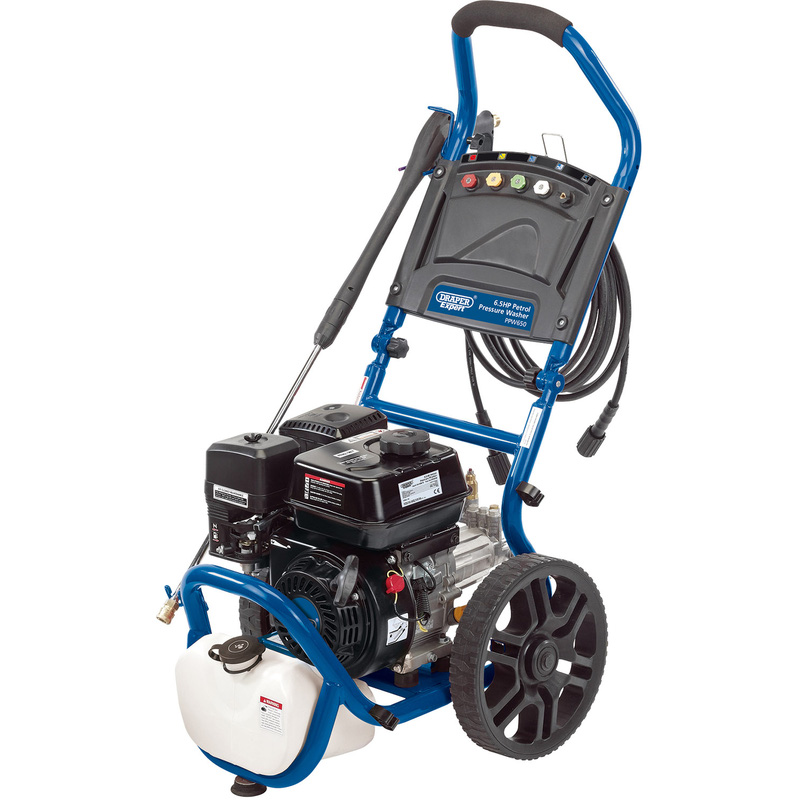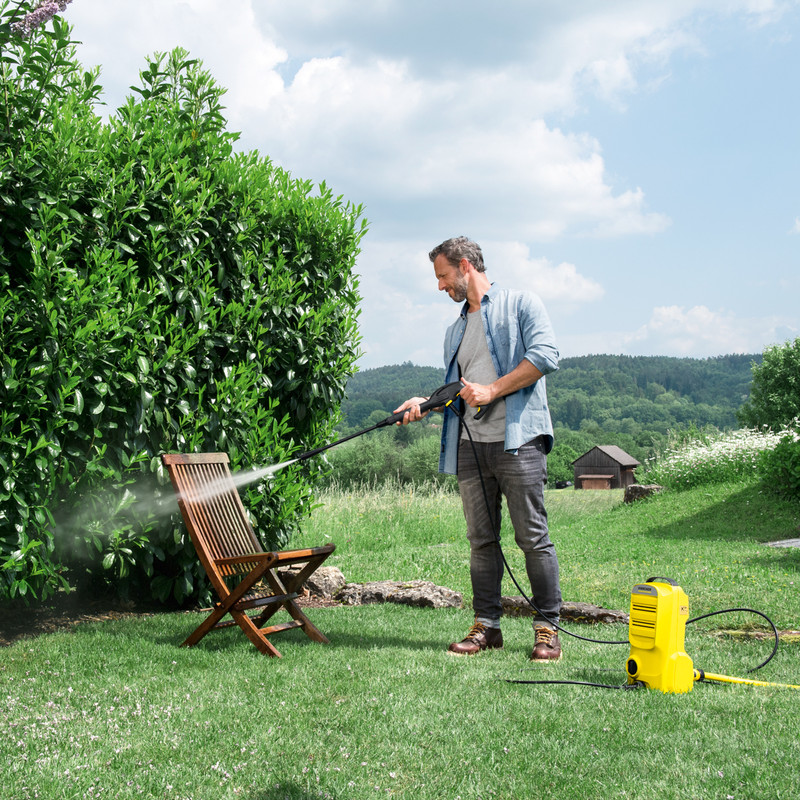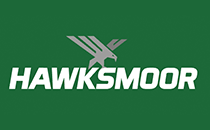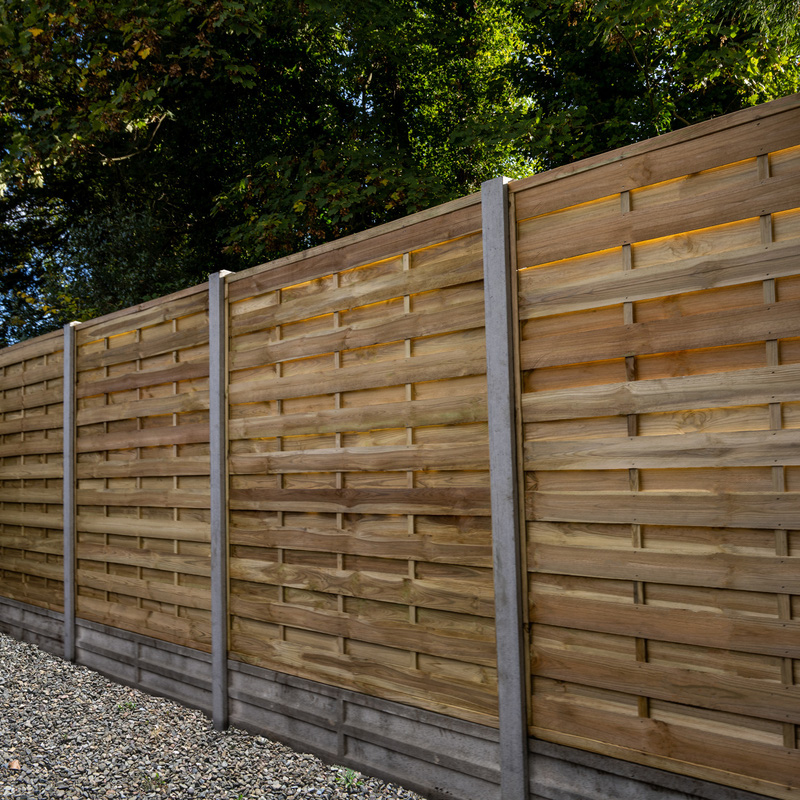Want to spruce up your deck, clean your bike, or give your motorhome and conservatory a much-needed facelift? Toolstation's range of electric and petrol pressure washers has you covered! But with so many options available, choosing the best pressure washer can seem overwhelming.
To find the best pressure washer for you, you’ll want to consider how regularly you’re planning to use your jet washer, your budget, as well as what you’ll use it for.
If you're freshening up your garden furniture and decking in time for summer, a light-duty jet washer with 100/110 Bars of pressure will be perfect. But if you’re looking to deep clean a neglected hot tub, we recommend a heavy-duty model with 130+ Bars of pressure.
If you’re looking for something more versatile, a variable power pressure washer will be ideal for smaller tasks as well as heavy-duty cleaning.
Types of Pressure Washer

Electric Pressure Washers
Electric pressure washers are the most common type. Powered through the mains supply, they’re often cheaper and quieter than petrol alternatives. You’ll find them in a range of pressures, but they’re especially ideal for use around the home where you’ll have a constant power supply – such as cleaning decking, bikes, cars, and fences.
Once you’ve bought an electric jet washer, that’s all you pay for. There’s no need to worry about buying more fuel or investing in regular maintenance – simply store it in a secure, dry place and it’ll be ready and waiting for you next spring.
As with any corded tool, you’re limited by the length of the pressure washer cable and the need for constant power supply. If you have a very large garden or need to reach far corners, you might find electric power washers limited. Additionally, some people find they’re less durable for very regular use compared to their petrol counterparts.
Advantages
-
Minimal maintenance and extra costs
-
Lower priced than petrol pressure washers
-
Relatively quiet and lightweight
Things To Consider
-
Cable can limit you and increase risk of tripping
-
Less durable for regular use
-
Less reliable to take from job-to-job

Petrol Pressure Washers
Petrol pressure washers are durable, fuel-powered models offering versatility and convenience when working job-to-job. They’re highly powerful and suitable for heavy-duty cleaning tasks – at Toolstation you’ll even find variable power petrol washers if you need something for light jobs, too.
With a petrol washer, you don’t need to worry about tripping on trailing cables, and you can take it far from a power supply without being limited by the length of the cord. This makes petrol models ideal for tradespeople or those with larger gardens.
However, you should consider that buying a petrol pressure washer isn’t the last time you’ll invest in it – they require routine maintenance and fuel top-ups to keep them in great shape for years to come. Additionally, the most common petrol recently is E10 – with a greater ethanol content that can damage your washer if you leave fuel in it for long periods of time.
Advantages
-
Durable and very powerful
-
Take it wherever you like – no cable limitations
-
Variable power models available – ideal for light to heavy duty jobs
Things To Consider
-
Requires continual investment and maintenance
-
Petrol needs to be taken out of the fuel tank after use
-
Consider a sturdy fuel container for safe transportation
Key Pressure Washer Features
Pressure
The pressure of a jet washer is measured in Bar – you’ll find most pressure washers range between 110 and 180 Bar.
A low pressure, 110 Bar jet washer will be perfect for cleaning garden furniture, bikes, cars and decking. You’ll be able to get off most superficial dirt on most surfaces with a pressure washer with this power.
If you’re looking for something a bit more heavy duty, such as to brighten patio slabs, 130 Bar is often more than enough. If you’re in the trade, you may be interested in jet washers up to 180 Bar or higher – these may damage cars and garden furniture, but will clean masonry and iron with ease.
Hose Length
The length of a pressure washer hose starts around 3 metres, but can go up to more than 10 metres for more expensive models. Long hoses are ideal when you need to reach far corners – such as the back corner of a large swimming pool.
A longer hose could be a nuisance in small spaces – it can get damaged by kinking or snagging, and makes the washer heavier. We recommend only choosing hoses longer than 10 metres if you regularly work in large spaces and really need the extra reach.
For hoses over 10 metres, you may also notice that the pressure is reduced slightly – but this is a negligible difference between 3 and 10 metres.
Lances
A lance is the long pipe that extends from a pressure washer trigger and shoots out water. A longer lance will help you wash hard-to-reach areas without bending or arching your back.
Variable pressure lances, also called variable fan-jet lances, allow you to vary the force of the jet from a focused point to a broad fan.
Angled lances are ideal for cleaning underneath cars or garden furniture. Rotary jet lances spin while spraying – great for cleaning heavily soiled paving slabs, but too powerful for cars or decking.
Auto Start/Stop
An auto start/stop trigger for your pressure washer at one end of the lance is great for saving water and reducing the time your pressure washer is on for.
When you pull the trigger, the water comes out. When you let go, the water stops.
If you have a large space, a pressure washer without an auto start/stop feature, and decking at the far end of your garden to clean, you’ll have to run the water until you get there or recruit a family member to switch it on – this could get annoying!
Pump Type
A pressure washer pump is the part that pushes the water through the hose and out of the lance with the force required to clean surfaces. There are three main types of pump: composite, aluminium, and brass.
Composite pumps are best suited for pressure washers that get used a maximum of 3 to 4 hours a month. Aluminium pumps are slightly more durable and better for regular or longer use.
Brass pumps are top-of-the-market, designed for intensive use – meaning they're ideal for tradespeople. Composite pumps come at the lowest cost, aluminium slightly higher, and brass pumps are the most expensive.
Motor Type
The motor is the part of the power washer that’s powered by fuel or electricity and makes everything else work. There are three main types of motor to choose from when buying a pressure washer: brushed, universal, and induction.
Brushed motors are the least common, but are cheaper than universal and induction models. They’re an economical option for DIYers cleaning cars or decking.
Universal motors are small, lightweight and affordable – but less efficient and louder than induction motors. They’re ideal for occasional use. Induction motors are very powerful, efficient and long lasting, perfect for regular use.
Motor Cooling Type
Motors need to be consistently cooled during use to function properly and stop your pressure washer from malfunctioning. You’ll find water-cooled and air-cooled models.
Air-cooled models use air flow via a fan to cool the motor. They’re lightweight and come with a lower price-tag. However, they're less effective than water-cooled motors.
Water-cooled models use a water tank next to the motor to cool it down. These tend to be highly effective at cooling the motor down and make for a much more durable pressure washer.
Pressure Washer Accessories
Wash Brushes
Wash brushes attach to the end of a pressure washer lance and help clean cars, greenhouses and conservatories that may need a bit of TLC.
Patio Cleaners
Patio cleaners are circular plastic hoods with a brush around the bottom edge. They help ensure dirty water doesn’t spray around everywhere.
Integrated Storage
If you’re short on space, or need to regularly take your pressure washer from job-to-job, integrated storage means it’s all tucked in nicely into the one tool. You can tuck away cables, the detergent tank, hoses and lances so you never leave things behind.
Suction Hoses
A pressure washer suction hose allows the water to be taken from a static source instead of a tap – such as a water butt, pond, or bucket. This means you’ll avoid using too much water for smaller cleaning jobs, perfect for the eco-conscious.
Detergent Tanks and Systems
Detergent tanks hold the detergent within the pressure washer system, rather than either just using water or needing to syphon detergent from a separate source. This is ideal for tough jobs that need far more than just water, whilst allowing you to still move around with ease without considering a detergent bucket.
Pressure Washer Detergents
Pressure washer detergents aren’t necessary for all cleaning jobs – lots of dirt can be washed off just with the force of the water. However, detergents can improve cleaning and remove stubborn stains – dissolving dirt and allowing it to be washed away.








